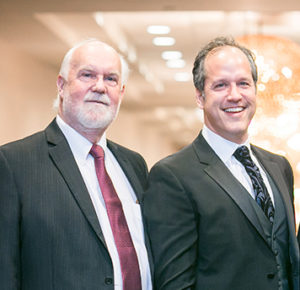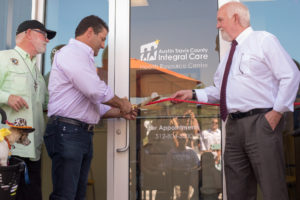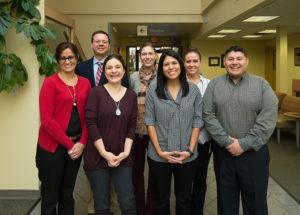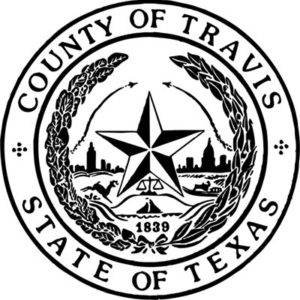TRANSPARENCIES
A monthly newsletter from Integral Care.
A monthly newsletter from Integral Care.

A Message From Our Board Chair
 Over the past 25 years, we have witnessed changes and innovations that have improved health outcomes for people living with mental health issues, substance use disorders and/or intellectual and developmental disabilities. Changes in attitudes and policies have created a more progressive system for the people that we exist to serve. Integral Care has grown in this time to serve more than 30,000 people each year through more than 30 programs with a workforce of nearly 900 people. Leading this large network of dedicated and experienced staff is our CEO, David Evans. This month marks David’s 25th anniversary as CEO and we are thrilled to recognize this milestone.
Over the past 25 years, we have witnessed changes and innovations that have improved health outcomes for people living with mental health issues, substance use disorders and/or intellectual and developmental disabilities. Changes in attitudes and policies have created a more progressive system for the people that we exist to serve. Integral Care has grown in this time to serve more than 30,000 people each year through more than 30 programs with a workforce of nearly 900 people. Leading this large network of dedicated and experienced staff is our CEO, David Evans. This month marks David’s 25th anniversary as CEO and we are thrilled to recognize this milestone.
I had a chance to sit down with David and reflect on the changes he has seen over the years, the innovation and progress he’s witnessing and what he sees ahead for Integral Care.
– Hal Katz, Integral Care Board Chair
Hal Katz: David, you have over 35 years of experience as a leader in the fields of behavioral health and intellectual and developmental disabilities. With your leadership, Integral Care staff provide our community a strong foundation for well-being. What major changes have you seen for the agency in the past 25 years?
David Evans: One big change has been the way we are integrating health care services – within the agency and in working with partners.
In the beginning, there was a single state agency that defined the scope and funding of how we operated, which was the Texas Department of Mental Health and Mental Retardation (MHMR). Today we have a diversification of funding and a system that includes a comprehensive array of services. This approach makes a variety of integrated, wraparound services and supports available to a wide array of individuals – persons with autism spectrum disorder, those experiencing substance use disorder or homelessness, to name a few. The staff in this system use evidence-based best practices, trauma-informed care, and person-centered planning to improve the overall health of a person.
 Another part of the integration of services is the many meaningful, collaborative partnerships we have built – ECHO, NAMI, EMS and local law enforcement, to name just a few. We are integrated in so many places around the community – for example our Healthy Community Collaborative program provides mental health care at the Topfer Family Health Resource Center for people living at Community First! Village. Community First! Village provides affordable, sustainable housing and a supportive community for individuals with a disability who are experiencing homelessness.
Another part of the integration of services is the many meaningful, collaborative partnerships we have built – ECHO, NAMI, EMS and local law enforcement, to name just a few. We are integrated in so many places around the community – for example our Healthy Community Collaborative program provides mental health care at the Topfer Family Health Resource Center for people living at Community First! Village. Community First! Village provides affordable, sustainable housing and a supportive community for individuals with a disability who are experiencing homelessness.
Hal Katz: What has been one policy or system change you have seen, that has made the biggest impact in mental health care?
David Evans: The 1115 Medicaid Waiver was a big moment for mental health care. Within six months of it being introduced, we had 13 new projects underway. The Waiver helped build a continuum of services for mental health and substance use disorder. It helped providers to take a more holistic approach to meeting the needs of their clients.
Another system change that I am excited about is our designation as a Certified Community Behavioral Health Clinic (CCBHC). We are standardizing our operations to meet new national guidelines, integrating targeted acute care services into our mental health and substance use disorder services, so that our clients get an even higher standard of care. It sets us up for better funding opportunities at the federal, state, and local level, as well as improving care delivery that will benefit our clients.
Hal Katz: What are you currently excited about as far as mental health care is concerned, as well as the possibilities for the future?
 David Evans: Currently, I’m excited about collaboration, de-stigmatization and technology. Today, schools, local governmental non-profit organizations, workforce boards, jails, and courts are all working together to improve outcomes for people in our community. Awareness campaigns and high profile celebrities are challenging ignorance, fear and stigma. Innovations like online social networks, the ability to utilize technology via phone applications and enhancing treatments using telepsychiatry are exciting advancements for mental health care.
David Evans: Currently, I’m excited about collaboration, de-stigmatization and technology. Today, schools, local governmental non-profit organizations, workforce boards, jails, and courts are all working together to improve outcomes for people in our community. Awareness campaigns and high profile celebrities are challenging ignorance, fear and stigma. Innovations like online social networks, the ability to utilize technology via phone applications and enhancing treatments using telepsychiatry are exciting advancements for mental health care.
 Breakthroughs in science are on the horizon – new treatment approaches, new medications, the strategic use of big data to monitor the health of our community and even artificial intelligence for things like early detection of mental health conditions. Having a deep collaboration with Dell Medical School will allow us to stay close to exciting new scientific discoveries.
Breakthroughs in science are on the horizon – new treatment approaches, new medications, the strategic use of big data to monitor the health of our community and even artificial intelligence for things like early detection of mental health conditions. Having a deep collaboration with Dell Medical School will allow us to stay close to exciting new scientific discoveries.
I am seeing a future where people with mental illness and IDD are no longer isolated and that effective and appropriate services are accessible. By working together and continually pushing for innovation, we are ensuring healthy living for everyone in Travis County.
Integral Care Proud to be a Certified Community Behavioral Health Clinic
Integral Care is honored to be one of the few Certified Community Behavioral Health Clinic (CCBHC) pilot sites in the state of Texas. Through a rigorous application process, Texas Health and Human Services Commission (HHSC) selected us as 1 of only 8 sites (among 25 interested centers) that exhibited the highest levels of readiness to participate in the CCBHC certification process. Over the course of a planning year, Integral Care prepared to become a CCBHC through continued partnership with HHSC staff, and in October 2016 received HHSC’s certification.
 Becoming a CCBHC pilot site has meant adopting new national guidelines that standardize operations for mental health, substance use, community based and physical health care services. CCBHC standards promote better access to high quality care for people with serious mental illness, those with severe substance use disorders, children and adolescents with serious emotional disturbance and those with co-occurring mental, substance use or physical health disorders. The CCBHC model puts an emphasis on the provision of 24-hour crisis care, culturally competent care for veterans, utilization of evidence-based practices, care coordination and the advancement of the integration of behavioral health and physical health care. As early adopters of CCBHC standards, Integral Care is positioned to help guide the nationwide policy.
Becoming a CCBHC pilot site has meant adopting new national guidelines that standardize operations for mental health, substance use, community based and physical health care services. CCBHC standards promote better access to high quality care for people with serious mental illness, those with severe substance use disorders, children and adolescents with serious emotional disturbance and those with co-occurring mental, substance use or physical health disorders. The CCBHC model puts an emphasis on the provision of 24-hour crisis care, culturally competent care for veterans, utilization of evidence-based practices, care coordination and the advancement of the integration of behavioral health and physical health care. As early adopters of CCBHC standards, Integral Care is positioned to help guide the nationwide policy.
CCBHCs are the future of care delivery in our evolving health care ecosystem. By working within the CCBHC model, we are positioning Integral Care for better funding opportunities at the federal, state, and local level. In March, Congress passed an omnibus spending bill allocating $100 million to CCBHCs. The Substance Abuse and Mental Health Services Administration (SAMHSA) will be distributing those funds via a grants process sometime next month. New CCBHC funding is anticipated to make a big difference in the area of treatment for opioid disorders.
Ultimately, operating as a CCBHC improves care delivery and thus improves the overall health of the people we serve.
City of Austin & Travis County
Integral Care’s longest-standing partners are the City of Austin and Travis County. They are both deep and meaningful partners who have supported us since our inception in 1967.
 Through interlocal agreements, they invest dollars that support our function as the Local Mental Health and Intellectual and Developmental Authority for the area, as well as our role as a service provider. Their funding also helps with community planning activities and resource development to address gaps and needs in our community. Every dollar invested by the city and county leverages state dollars to advance our mission to provide Healthy Living for Everyone.
Through interlocal agreements, they invest dollars that support our function as the Local Mental Health and Intellectual and Developmental Authority for the area, as well as our role as a service provider. Their funding also helps with community planning activities and resource development to address gaps and needs in our community. Every dollar invested by the city and county leverages state dollars to advance our mission to provide Healthy Living for Everyone.
City of Austin: The city’s investment of $9,314,014 in Fiscal Year 2017 bolstered HIV services, housing and homelessness services, substance use disorder services, and youth services for people experiencing behavioral health challenges or intellectual and/or developmental disabilities (IDD). Beyond the financial investment, Integral Care values our strong working relationship in joint programs with the city – including the Homelessness Outreach Street Team collaboration and our multi-faceted work with the Austin Police Department, Downtown Austin Community Court and EMS.
“The City of Austin’s Public Health department has been a partner with Integral Care for the well over 30 years. Over the years, the leadership of the department has changed; however the commitment to the partnership has strengthened….We are committed to the total health and well-being of our community.”
– Stephanie Hayden, Director, Austin Public Health
 Travis County: The county’s investment of $5,778,577 in Fiscal Year 2017 bolstered substance use disorder services, child and family services, and mental health support for people in Travis County jails. Our robust collaboration with the Travis County Sheriff’s Office, Travis County Jail and Constables – just like our city partnerships – work to improve how our community responds to and supports individuals who experience behavioral health and/or IDD challenges.
Travis County: The county’s investment of $5,778,577 in Fiscal Year 2017 bolstered substance use disorder services, child and family services, and mental health support for people in Travis County jails. Our robust collaboration with the Travis County Sheriff’s Office, Travis County Jail and Constables – just like our city partnerships – work to improve how our community responds to and supports individuals who experience behavioral health and/or IDD challenges.
Together, the City of Austin, Travis County and Integral Care are diverting people from jails and emergency rooms to the care they need, reducing recidivism and producing better health outcomes for people in our community. Integral Care is grateful to both the city and county for believing in our mission and investing in us. Thank you for ensuring that the people of Austin-Travis County have access to quality care and services, so that everyone has the tools to reach their full potential.
August: A Milestone Moment
July: Equity in Mental Health Care for All
June: Expanding Services for Veterans
May: Your Mental Health Toolkit
April: Time of Terror Calls for Increased Emotional Support
March: Stopping the cycle of incarceration for individuals with mental illness
February : Equity in mental healthcare for everyone
January : Improving Mental Health Through Partnership & Collaboration
December : Strength Through Community
November : Healthy Lifestyles Improve Well-Being
October : National Child Health Day
September : Strengthening Families and Communities